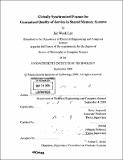| dc.contributor.advisor | Krste Asanović and Arvind. | en_US |
| dc.contributor.author | Lee, Jae Wook, Ph. D. Massachusetts Institute of Technology | en_US |
| dc.contributor.other | Massachusetts Institute of Technology. Dept. of Electrical Engineering and Computer Science. | en_US |
| dc.date.accessioned | 2010-05-25T20:49:51Z | |
| dc.date.available | 2010-05-25T20:49:51Z | |
| dc.date.copyright | 2009 | en_US |
| dc.date.issued | 2009 | en_US |
| dc.identifier.uri | http://hdl.handle.net/1721.1/55117 | |
| dc.description | Thesis (Ph. D.)--Massachusetts Institute of Technology, Dept. of Electrical Engineering and Computer Science, 2009. | en_US |
| dc.description | Cataloged from PDF version of thesis. | en_US |
| dc.description | Includes bibliographical references (p. 135-147). | en_US |
| dc.description.abstract | Resource contention among concurrent threads on multicore platforms results in greater performance variability of individual threads than traditionally seen with time-multiplexed threads on single-core platforms. This performance variability makes it hard to provide performance guarantees, degrades parallel program performance, and burdens software writers by making performance tuning and load balancing more challenging. In this thesis, we propose a novel QoS framework, called Globally Synchronized frames (GSF), to combat the performance variability problem in shared memory systems. We first apply GSF to a multi-hop on-chip network to provide QoS guarantees of minimum bandwidth and maximum delay for each flow sharing the network. The GSF framework can be easily integrated with a conventional virtual channel (VC) router without significantly increasing the hardware complexity. We then present an extended version of GSF framework to provide end-to-end QoS for cache-coherent shared memory systems, which is called GSF memory system (GSFM). GSFM employs a single unified framework to manage multiple heterogeneous bandwidth resources such as on-chip networks, DRAM banks and DRAM channels, to achieve better hardware efficiency and composability towards end-to-end QoS than component-wise QoS approaches. Finally, we propose the METERG (MEasurement Time Enforcement and Runtime Guarantee) QoS framework. | en_US |
| dc.description.abstract | (cont.) Independent of GSF, the METERG framework provides an easy method to obtain a tight estimate of the upper bound of a program's execution time for a given resource reservation setting. Our approach is based on simple measurement without involving any expensive program analysis or hardware modeling. | en_US |
| dc.description.statementofresponsibility | by Jae Wook Lee. | en_US |
| dc.format.extent | 147 p. | en_US |
| dc.language.iso | eng | en_US |
| dc.publisher | Massachusetts Institute of Technology | en_US |
| dc.rights | M.I.T. theses are protected by
copyright. They may be viewed from this source for any purpose, but
reproduction or distribution in any format is prohibited without written
permission. See provided URL for inquiries about permission. | en_US |
| dc.rights.uri | http://dspace.mit.edu/handle/1721.1/7582 | en_US |
| dc.subject | Electrical Engineering and Computer Science. | en_US |
| dc.title | Globally Synchronized Frames for guaranteed Quality-of-Service in shared memory systems | en_US |
| dc.title.alternative | GSF for guaranteed QoS in shared memory systems | en_US |
| dc.type | Thesis | en_US |
| dc.description.degree | Ph.D. | en_US |
| dc.contributor.department | Massachusetts Institute of Technology. Department of Electrical Engineering and Computer Science | |
| dc.identifier.oclc | 593360074 | en_US |
